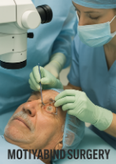What is Glaucoma?
Glaucoma is a group of eye diseases that damage the optic nerve, which is responsible for transmitting visual information from the eye to the brain. This damage often occurs due to increased pressure within the eye, called intraocular pressure, but can also occur even when the pressure is within normal range.
Doctors often call glaucoma the “silent thief of sight” because it usually shows no symptoms until significant vision loss occurs, and the optic nerve damage becomes irreversible. The most common type of glaucoma, called open-angle glaucoma, develops slowly and painlessly over time and can affect both eyes.
Early detection and treatment are critical in preventing or slowing down the progression of glaucoma. Treatment options may include medications, eye drops, laser therapy, or surgery. It is essential to have regular eye exams to detect glaucoma and macular degeneration early, especially if you have a family history of the disease or are over the age of 40.

What is Macular Degeneration?
Macular degeneration is a medical condition that affects the macula, which is part of the eye responsible for sharp, central vision. Doctors also know it as age-related macular degeneration (AMD) because it typically occurs in older adults, though it can affect younger individuals as well.
The condition characterizes by the deterioration of the macula, leading to blurry or distorted vision in the central field of vision. This can make it difficult to read, recognize faces, drive, or perform other daily tasks that require clear vision.
Macular degeneration comes in two different types: dry and wet. While both of them can cause vision problems, wet macular degeneration is usually more severe. Dry macular degeneration is more common and occurs when the macula gradually thins and breaks down over time. Wet macular degeneration is less common but more severe, and occurs when abnormal blood vessels grow under the macula and leak fluid and blood, causing rapid damage to the macula.
While there is no cure for macular degeneration, there are Glaucoma and Macular Degeneration treatments that can slow the progression of the disease and help individuals with the condition maintain their vision. It is important to get regular eye exams and consult with an eye doctor if you experience any changes in your vision.
What are the symptoms of glaucoma and macular degeneration?
Glaucoma and macular degeneration are two different eye conditions, and their symptoms can be quite different.
Symptoms of Glaucoma:
Gradual loss of peripheral vision: This is often the first sign of glaucoma, and it may not be noticeable at first.
Tunnel vision: As glaucoma progresses, your field of vision may become smaller, leading to tunnel vision.
Blurred vision: Glaucoma can cause blurred vision, especially in the later stages of the disease.
Halos around lights: Some people with glaucoma may see halos around lights, particularly at night.
Eye pain and redness: These symptoms are less common, but they can occur if your eye pressure is very high.
Symptoms of Macular Degeneration:
Blurred or distorted central vision: Macular degeneration affects the central part of the retina, which is responsible for sharp, detailed vision. As a result, you may experience blurry or distorted vision in the center of your field of view.
Reduced color vision: You may have difficulty distinguishing colors, particularly in the early stages of the disease.
Difficulty recognizing faces: As macular degeneration progresses, you may have trouble recognizing faces or other details.
Dark or empty spots in your vision: You may notice dark or empty spots in your central vision.
Visual hallucinations: In some cases, people with macular degeneration may experience visual hallucinations, such as seeing shapes or colors that aren’t there.
It’s important to note that both glaucoma and macular degeneration can develop without any noticeable symptoms, especially in the early stages. Regular eye exams are the best way to catch these conditions early and prevent vision loss.
What are the causes of macular degeneration?
Macular degeneration is a condition that affects the macula, a part of the retina responsible for sharp central vision. There are two main types of macular degeneration, which are dry and wet. The causes of macular degeneration can vary depending on the type of macular degeneration:
Dry macular degeneration: This is the most common type of macular degeneration and is often associated with aging. It occurs when the macula thins and breaks down over time, causing vision loss. Other risk factors for dry macular degeneration include smoking, high blood pressure, high cholesterol, obesity, and a family history of the condition.
Wet macular degeneration: This type of macular degeneration occurs when abnormal blood vessels grow beneath the retina, leaking fluid and blood into the macula. Researchers do not fully understand the causes of wet macular degeneration, but they believe it relates to genetics and environmental factors such as smoking and a diet high in saturated fat.
In both types of macular degeneration, oxidative stress, and inflammation have been suggested as potential contributors to the development and progression of the disease. Additionally, certain genetic variations may increase the risk of developing macular degeneration.
How Are They Related?
Glaucoma is a group of eye diseases that damage the optic nerve, which transmits visual information from the eye to the brain. This damage is usually caused by elevated intraocular pressure (pressure within the eye), which can lead to gradual loss of peripheral vision and, in advanced cases, blindness.
Macular degeneration, on the other hand, is a condition that affects the macula, which is the central part of the retina responsible for sharp, central vision. It is caused by damage to the macula, which can lead to blurry or distorted vision in the central field of vision.
While glaucoma and macular degeneration are distinct conditions, they can both lead to vision loss if left untreated. Moreover, some risk factors for both conditions are similar, such as age, family history, and certain medical conditions like high blood pressure and diabetes. In some cases, a person may have both glaucoma and macular degeneration, which can significantly impact their vision and require specialized treatment.
It’s important to have regular comprehensive eye exams to detect and treat any potential eye problems early. If you have concerns about your vision or eye health, you should speak with your eye doctor.
What are the treatments for glaucoma and macular degeneration?
Glaucoma and macular degeneration are two different eye diseases that can cause vision loss and blindness if left untreated. Here are some of the treatments for each:
Glaucoma:
Eye drops: Doctors commonly prescribe eye drops to lower eye pressure, which is often the main goal in treating glaucoma. They usually instruct patients to take these drops several times per day to keep the pressure under control.
Laser therapy: Doctors can use several types of laser therapy to treat glaucoma. One common type, called selective laser trabeculoplasty (SLT), helps reduce eye pressure.
Surgery: If medications and laser therapy are not effective in controlling the pressure in the eye, surgery may be necessary. There are a few different types of surgery that can be used to treat glaucoma, such as trabeculectomy and tube shunt surgery.
2. Macular Degeneration:
Anti-VEGF Injections: Injections of drugs that target a specific protein called VEGF (vascular endothelial growth factor) can help to slow or stop the growth of abnormal blood vessels in the retina which can lead to vision loss. These injections are usually given directly into the eye.
Photodynamic therapy: This involves the injection of a light-sensitive drug into a vein in your arm, which travels to the abnormal blood vessels in your eye. A laser is then used to activate the drug, which then destroys the abnormal blood vessels.
Vitamins and supplements: Studies have shown that high doses of certain vitamins and minerals, such as vitamins C and E, beta-carotene, and zinc, may help slow the progression of macular degeneration in some people.
It’s important to note that both glaucoma and macular degeneration are chronic diseases that require ongoing treatment and management. Regular eye exams and communication with your eye doctor are essential to ensure that your treatment plan is working effectively.
What are the risks associated with glaucoma and macular degeneration?
Glaucoma and macular degeneration are two common eye conditions that can lead to significant vision loss and blindness.
The risks associated with glaucoma include:
Vision loss: Glaucoma causes damage to the optic nerve, which can lead to permanent vision loss if left untreated.
Blindness: In severe cases, glaucoma can cause complete blindness.
Peripheral vision loss: Glaucoma often affects peripheral vision first, which can make it difficult to see objects off to the side or navigate through crowded areas.
Increased pressure in the eye: Glaucoma is often associated with increased pressure inside the eye, which can cause further damage to the optic nerve.
Family history: People with a family history of glaucoma are at a higher risk of developing the condition.
The risks associated with macular degeneration include:
Vision loss: Macular degeneration causes damage to the macula, the part of the retina responsible for central vision, which can lead to permanent vision loss.
Blindness: In severe cases, macular degeneration can cause complete blindness.
Age: Macular degeneration is more common in people over the age of 60.
Smoking: Smoking is one of the Worst Things You Can Do for Your Eyes. Smoking is a major risk factor for macular degeneration, which is the leading cause of blindness.
Family history: People with a family history of macular degeneration are at a higher risk of developing the condition.
Author Details:
Dr. Thanemozhi Srinivasan is an esteemed ophthalmologist who has achieved remarkable success in the specialized field of glaucoma. With a diverse and illustrious background, she has garnered extensive experience and honed her expertise in diagnosing, managing, and treating this intricate eye condition. Driven by a profound dedication to her patients, Dr. Srinivasan embraces cutting-edge techniques and innovative treatments, aiming to optimize visual outcomes while delivering compassionate and individualized care. With her wealth of knowledge, remarkable proficiency, and unwavering commitment to excellence, Dr. Thanemozhi Srinivasan stands as a revered authority in the realm of glaucoma.














One thought on “If you have any risk factors for Glaucoma or Macular Degeneration, see an eye doctor for a comprehensive eye exam today.”
Comments are closed.